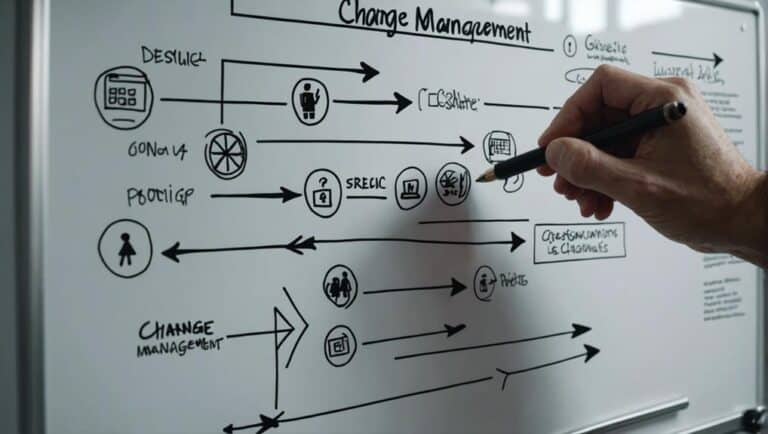A change management workshop is important to increase the level of understanding of organizational changes and the most effective ways to manage change. It is also a crucial step in helping to minimize resistance to change for organizational processes’ continuity. But what is the best approach to conduct a change management workshop?
To conduct a successful change management workshop, set the objectives early on and determine who should attend. Identify key areas to focus on and allow enough time for the workshop. Develop your cases for change and how to respond to it, and be sure to cover success factors of change management.
This article will discuss valuable questions related to the above topic, including some main topics to focus on in your workshop, who should attend, and some critical considerations for an effective change management workshop. Read on for more.
1. Set the Objectives of the Workshop
Before exploring the best approach to conducting a change management workshop, it is crucial first to understand the objective of such workshops. According to IHRDC, change management is becoming increasingly vital to the success of modern organizations.
According to the above source, most projects fail due to a lack of proper change management, which can cost an organization billions of dollars per annum. Therefore, organizational leadership is increasingly appreciating the need to change human attitudes and behaviors from the onset of the project to increase the likelihood of success.
This is where change management workshops come into play.
Change management workshops help to elevate the participants’ understanding of change management, and enhance their ability to assess, plan and implement large-scale business changes.
In most instances, the change management workshop will be tailor-made to fit the specific needs and objectives of the organization. This can range from solving one or more organizational challenges to analyzing and assessing specific elements of change management.
Some main objectives of conducting a change management workshop include the following:
- Foster an appreciation of change management in project success
- Enhance planning and control of the change process to meet specific timelines
- Improve working relationships across different levels of management, stakeholders, and organizational staff
- Provide an effective platform to guide the team through performance slumps for faster recovery times
- Foster accountability across all organizational levels
- Gain a better understanding of some success factors associated with organizational change
- Learn how to design the best approaches that are customized to meet the organizational needs.
- Learn about the tools, procedures, and templates necessary to help them deal with organizational changes, etc

2. Determine Who Should Attend the Workshops
According to the change management experts at Variance Reduction, all persons who are responsible for implementing change initiatives within an organization should attend the change management workshop.
Therefore, managers, team leaders, and supervisors tasked with these initiatives need to attend these change management workshops. The experts at Prosci also note that project team members should also attend these change management workshops, as well as any person who intends to head future change management initiatives in the company.
3. Identify the Key Areas to Focus on
While there is a consensus that change management workshops are crucial in solving common change management problems, different organizations adopt varying approaches. Identifying the key areas that relate to the unique needs of the organization in question will be crucial in guiding the process.
4. Determine the Time Period of the Workshop
The length of the change management workshop will largely depend on the number of items on the agenda. A change management workshop can take anywhere between a couple of days to a week.
According to the IHRDC, the length of the change management workshop depends on its objectives and the items on the agenda. For instance, a typical workshop that aims to train staff on planning, assessing, and implementing change can take anywhere from five days to a full week.
In support of the above, Nexum observes that these workshops can take as little as two days. Therefore, it is crucial to focus on the items included in the workshop and provide sufficient time for each item so that the process does not feel rushed.
5. Develop Cases for Change
The change management workshop should also provide guidelines for making a case for change. According to the University of Manchester, creating a case for change is a crucial step in delivering change. This is because it helps provide a rationale for the need for a certain change, following which a vision for the future can then be created.
Creating a case for change typically involves four critical steps as outlined below:
- State the reason why a given change is needed to establish its necessity. This usually also involves a statement of how this change can benefit the organization.
- Submit evidence in support of the proposed change. Here, the party making a case for change has to provide supporting evidence, typically in the form of documented complaints, performance results, market intelligence data, survey results, and so on. The amount of evidence needed will depend on how large or complex the proposed change is.
- Explore different potential solutions to the problem/challenge. In this step, the leader proposing the change assembles a team to brainstorm and generate potential solutions.
- Recommend a solution from the potential ideas generated in the previous step. The proposed solutions need to be first appraised so that the best solution is adopted.
Once the case for change is made, it needs to be approved by the manager to be complete.

6. Explore how To Respond To Change
According to Harvard Business School, an organization should be able to constantly adapt to changes within its internal and external environment, as well as other challenges. For instance, an organization has to be prompt in adapting to the threat posed by a rise of new competitors, changing technologies, changes in existing laws and regulations, and so on.
Failure to make these adjustments can either result in stagnated growth or business failure. The above source estimates that approximately 50 percent of all change initiatives fail. Therefore, having a sound understanding of how to effectively plan for change, coordinate the various change initiatives and implement the change are invaluable for modern organizations.
Team leaders, managers, and supervisors are often tasked with managing change initiatives. To do this effectively, they need to first receive the necessary training and guidelines on how to respond to these changes.
Ideally, the change management workshop should touch on both adaptive changes and transformational changes. The former relates to small and gradual changes that occur within an organization to improve its products, workflow, strategies, and even processes.
On the other hand, transformational changes tend to be more large-scale in nature, and tend to occur suddenly. Those tasks with managing these changes and change initiatives must thus be adept at guiding these organizational changes from the beginning until they are resolved.
7. Discuss Success Factors of Change Management
A change management workshop should also describe the main success factors of change management. The Australian Institute of Business explains that change management can be complex. Thus, those in charge of implementing change management initiatives should be aware of, and understand the weight of the main success factors for change management.
These success factors include the following:
- Planning: Planning is a key success factor as it establishes a clear vision for the change process. It also helps in establishing the success evaluation criteria.
- Communication: Communication is vital for both small and large organizations. Through effective communication, the leadership can help the various stakeholders understand the change, why it is necessary, the change management steps in place, the role they have to play in the change management process, and so on.
- Cultural Preparation: The leaders at every level of the organization need to raise awareness among the stakeholders on the need to change. These stakeholders also need to understand the consequences of reluctance to change, and the benefits to be derived from adopting the change.
- Integration and alignment of the projects: For change management to succeed, the change management leaders must collaborate across the various project teams. This way, they can align their plans and provide a unified direction.
8. Set the Standards for Accountability
Including accountability within the context of change management is crucial in any change management workshop. As explained by Align Org Solutions, leaders need to be accountable for what is or is not working during times of change.
By being accountable, the leaders demonstrate a level of commitment and desire to resolve any problem for the organization’s good. Accountability also entails a great deal of transparency. Essentially, the leader has to be willing to let others look behind the curtains and assess the progress or lack thereof for themselves.
Therefore, accountability helps foster trust with the project’s stakeholders, and those under them are more likely to have confidence in their actions.
9. Explore the Role of Change Leadership
Change leadership is often overlooked in leadership literature in favor of change management. This is even more reason why change leadership should be included in the change management workshop. Arguably, change leadership is one of the critical success factors for change implementation.
Whatfix defines change leadership as a people-centric and proactive approach to change management. According to this source, change management views change initiatives as vehicles for organizational growth and business improvement.
Successful change leadership requires leaders to be not only agile and visionary, but also to be highly responsive to any changes within the internal and external business environment. It also requires the leader to have a firm grasp on overcoming common barriers to change.

Therefore, change leadership focuses on long-term initiatives. It prioritizes adaptability and improvement within an organization.
The above is corroborated by the Indeed Editorial Team, who explains that it is important for leaders and managers to learn about change leadership. This is so that they can better manage or lead their employees.
Because change leadership is proactive, it enables the leader to prepare for unexpected challenges. By providing training in change leadership, a company is in a better situation to adapt to unforeseen changes within the ever-changing business environment and avert crises.
10. Determine How To Make Change Stick
One of the challenges of change management is how to make change stick. As explained by the management gurus at Prosci, an organization needs to implement deliberate efforts meant to sustain a given change.
Failure to actively sustain these changes can result in potentially costly business disruptions and losses in the change process. As the experts at ChangeFactory explain, change management programs have a high failure rate.
Making changes stick requires a multifaceted approach that includes developing tactics to overcome resistance to change, promoting cultural transformation, effective communication, and so on. Remember, the people in the organization need to adopt new behaviors for an organization to implement lasting change.
Read our article on How to Deal with Resistance in Change Management here.
Since a change management workshop aims to improve the management’s understanding of the facets of organizational change, it is very important that these workshops include training on how to make change stick. This becomes critical, especially when an organization is planning to implement significant changes.
11. Discuss the Role of Communication
Communication is highly crucial to the change management process. It is therefore important that change workshops not only focus on the importance of communication but how to communicate effectively during the change period.
As explained by Forbes, communication during the transition period will help the employees in understanding what you are working towards and why. As explained by the Keystone Education Group, one of the main goals of change management training seminars and workshops is to provide guidance and support people through the different stages of change.
Thus, your management workshops should provide useful communication tools to assist change managers during the transition period.
12. Highlight Case Studies of Change Management
An effective change management workshop needs to include several case studies of management. The objective of case studies is to provide examples of how other successful organizations have managed the change process.
These case studies also provide a valuable tool to assess the popular methods and trends in the change management space. Additionally, those responsible for implementing change initiatives can also better understand the best ways to address problems during organizational change by studying the solutions adopted by successful organizations.
Final Thoughts
Change management workshops are essential for organizations looking to implement change. However, to ensure that these workshops are effective, it is prudent first to define and outline the objectives, identify the key personnel, and highlight the main topics of discussion.
Essentially, the change management workshop should focus on enhancing your understanding of change management and providing adequate training on the skills needed for effective change management.
Consider the areas discussed in this article when designing your next workshop to increase its chances of success.
Are the Techniques for Running a Change Management Meeting Similar to those for Conducting a Change Management Workshop?
Yes, the techniques for running change management meetings are similar to those for conducting a change management workshop. Both require effective communication, engaging stakeholders, addressing resistance, and creating a collaborative environment. The focus in both settings is to guide the team through the change process smoothly and effectively.
Sources
- Harvard Business School: 5 Critical Steps in the Change Management Process
- Variance Reduction: Change Management Workshops
- The University of Manchester: How to Make a Case for Change
- Australian Institute of Business: 7 Key Factors for Successful Change Management
- Northern Kentucky University: Important Success Factors for Change Management
- LaMarsh Global: Top Success Factors in Effective Change Management
- IHRDC: Change Management Workshop
- EdgePoint LLC: How to Develop Change Management Training in your Company
- Management-Hub.com: Conducting a Change Management Workshop
- HRM Skills: Change Management Workshop
- Business Training Works: Change Management Training Courses and Workshops
- Variance Reduction International: Change Management Workshops
- Medium: Lean Change Management Workshop – Experience Report
- Align Org Solutions: The Role of Leadership in Change Management
- Eagles Flight: The Importance of Accountability in Leadership
- Whatfix: Change Leadership: How to Lead Change Effectively (2022)
- Indeed: Change Leadership: Definition, Benefits, Tips and Skills
- Shapiro Negotiations: What is Change Leadership
- Prosci: Top 3 Ways to Make Changes Stick
- ChangeFactory: Managing Change Strategy: Making Change Stick
- HR Grapevine: 4 Ways to Make Change Stick
- Beehive Strategic Communication: Change Management: Making Organizational Change Stick
- Forbes: The Importance of Communication When There is Change in a Company
- Findcourses.com: Gain the Skills to Facilitate Organizational Changes
- Prosci: Why Case Studies Matter when Learning Change Management
- Leadership and Performance Partners: Change Management
- Prosci: Delivering Project Results Workshop
- Nexum: Agile Change Management Workshop





